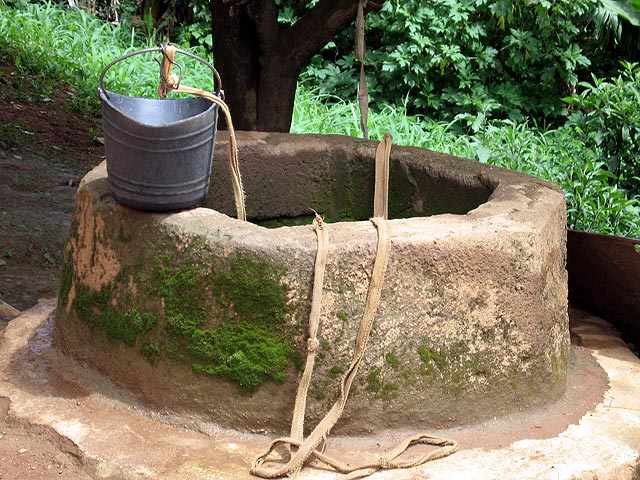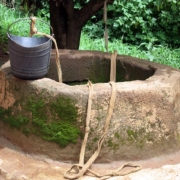Surge capacity and old wells

This week’s Torah portion, Toldot, is so rich. There’s great stuff here. This week we’ve got Rebecca conceiving twins, feeling them grapple with each other in her womb, asking God why this is her life. We get Jacob, whose name means The Heel because he grabs Esau’s heel on the way out of the womb.
There’s the whole thing with the birthright — first Esau bargains away his firstborn birthright for a bowl of lentils, then Rebecca coaxes Jacob to trick Isaac into giving the firstborn blessing to him instead of to his older twin. Or how about Esau begging his father, “Don’t you have a blessing for me, too?”
There are a dozen divrei Torah in what I just said! And yet I could not find the oomph to write any of them. Because our nation just hit a quarter of a million deaths from covid-19. And winter is coming, and with it, indoor life. And some people are planning to be indoors with others at Thanksgiving next week.
And some number of Americans still believe the virus is a hoax. I read this week in the Post about a nurse in South Dakota, in full PPE, tending to the dying…and the dying patients raging at her for wearing PPE around them because even as they were dying of covid they didn’t believe covid was real.
“These are the generations of Isaac” — that’s how the parsha begins. Isaac is situated in his family line, son of Abraham and Sarah, husband to Rebecca, father of Esau and Jacob. And I can’t stop thinking about today’s generations, truncated. Parents mourning their children. Children who have lost parents.
And I do not understand the refusal to take responsibility, the refusal to act as though we are all interconnected and what I choose to do can impact others. Because we are all interconnected. And whether or not I wear a mask might be the difference between someone else’s life and death.
How could I write a d’var Torah in the midst of all of that? And then someone pointed me to Tara Haelle’s essay on “surge depletion.” Haelle writes:
“Surge capacity is a collection of adaptive systems — mental and physical — that humans draw on for short-term survival in acutely stressful situations, such as natural disasters. But natural disasters occur over a short period, even if recovery is long. Pandemics are different — the disaster itself stretches out indefinitely.”
Haelle’s point is that in a short-term crisis, something in us rallies to pull through. Long-term anxiety and uncertainty — about the pandemic, the future of democracy, who will live and who will die, how much worse things may get before they begin to get better — that’s something else entirely.
We can function in crisis mode for only so long, and then our “surge capacity” gets depleted. Is this sounding familiar? And when our capacity becomes depleted, sometimes we go to the well — the well of inspiration, the well of hope, the well of faith — and there’s no water to be had. It feels like the well has run dry.
When I read that, I thought: yes. That’s what I’m feeling. That’s why I can’t muster what it takes to write. And that’s the image that brought me back to this week’s Torah portion.
In this week’s portion we read that Isaaac re-plumbed the wells that his father had dug. On the surface, that verse is about literally re-digging wells, which are pretty necessary in a desert climate! But on a metaphorical level, this verse reminds me how sometimes the wells of spirit and hope stop flowing.
When that happens, our job is to forgive ourselves for feeling tapped-out… and then to dig into those wells again, to open those channels so they can receive flow again. Here’s what I take from this week’s parsha: that spiritual work of opening channels for the flow of hope and faith isn’t a one-time thing.
So if you feel lately as though your spiritual well has run dry, you’re not alone. Join me in taking inspiration from Isaac, who went back to the old wells and dug away the silt and rocks so they could flow again. The wells of Torah and spiritual practice still flow, but we might need to open them up again.
Because this isn’t a short-term crisis. The pandemic isn’t going away anytime soon, and neither is the precariousness of our democracy or the poison in our public discourse. We can’t rely on surge capacity. We need to build deeper capacity in ourselves and in the systems that support us and our communities.
So here’s my prayer. May we find that those old wells of tradition and practice, when we tend them carefully and give them our attention, open up again to nourish and sustain us in every way. Starting right now, with a measure of Shabbat sweetness, Shabbat hope, and Shabbat rest. Shabbat Shalom.
This is the d’varling that Rabbi Rachel offered at Kabbalat Shabbat services. (Cross-posted to Velveteen Rabbi.)






